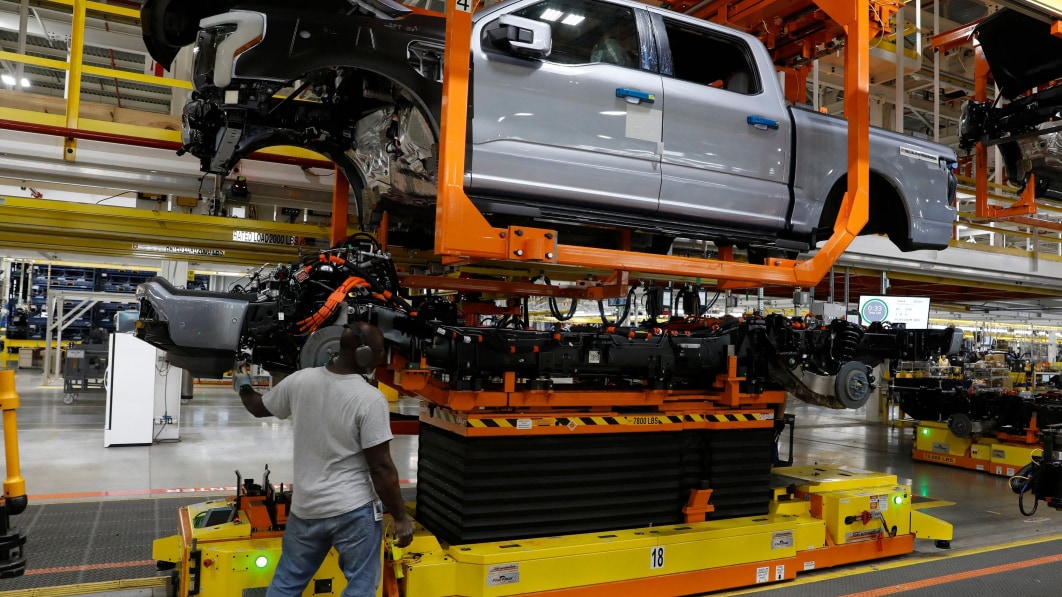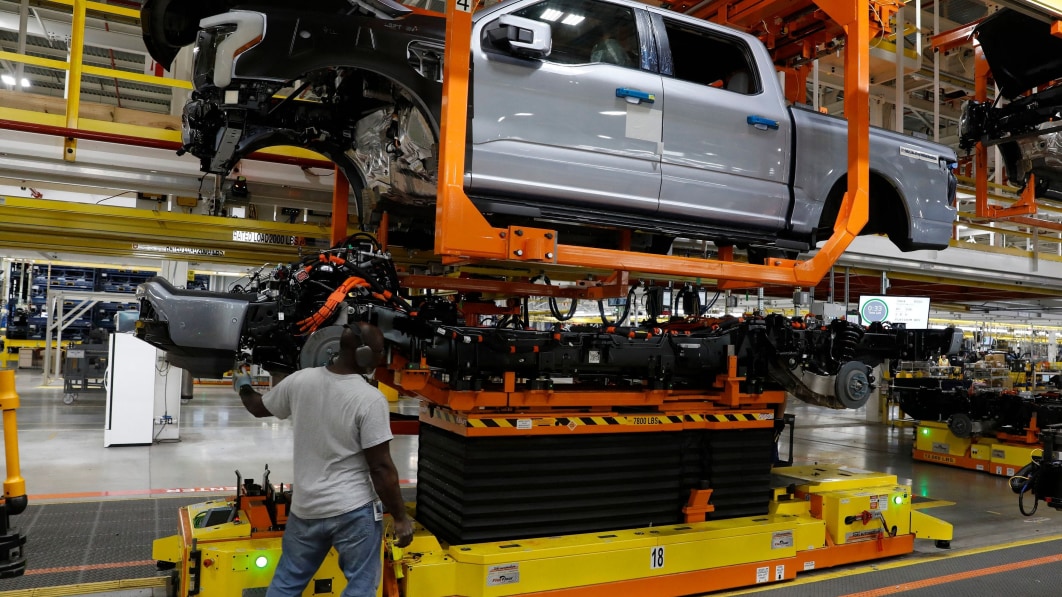[ad_1]
F-150 Lightning as it struggles with the EV changeover and
battery issues.
Jeff Kowalsky/AFP/Getty Photos
- Automakers continue to keep suffering from generation troubles.
- The pandemic, the change to EVs, and supply chain troubles are all to blame.
- But all of that could keep on to impact car potential buyers, professionals say.
Automakers preserve encountering production difficulties — and these days, it can be not necessarily owing to a lack of chips. Not only does that necessarily mean car or truck-obtaining is never heading back again to typical, there could be other impacts on buyers in conditions of charge, way too.
Ford earlier this thirty day period stopped generation of F-150 Lightning electrical pickups as it struggles with the changeover to electrical motor vehicles and a battery fire. In the meantime, the vehicle large also saw downtime at its factory in Louisville for the Ford Escape, related to a software issue. GM’s Bowling Eco-friendly plant will cease Corvette output this week due to a “areas offer concern.” Toyota has prepared to halt its Czech plant.
That is just in the earlier couple of months.
“When common styles this sort of as these have their manufacturing interrupted,” Sam Fiorani, vice president of world wide car forecasting at AutoForecast Options, told Insider by way of e mail, “it demonstrates a much larger concern in the supply chain that requirements to be dealt with fairly than doing the job as if this is just aspect of regular functions.”
A greater concern is looming, without a doubt. Regardless of tailwinds like huge income, significant demand, and small stock, automakers are bracing them selves for extra disruptions.
Regardless of whether those people constraints are residual impacts from the pandemic, newfound components shortages, or problems shifting to an all-electric powered car lineup, automobile corporations and their elements-makers are navigating an spectacular set of troubles.
What’s giving automakers a difficult time?
As predicted, new field entrants like Rivian have also halted output. This can, in portion, be attributed to the actuality that these organizations don’t have the exact supplier associations as their legacy competitors.
“With a car or truck that has hundreds of suppliers and thousands of elements coming from all those suppliers, it only normally takes a single component from one provider to stop the line,” Rivian CEO RJ Scaringe mentioned in a Q3 earnings simply call. He talked about dropping 5 times of output “since of a solitary element offer scarcity.”
The EV transition is just one particular of the industry’s worries.
“It is a whole new provide chain. It’s a entire different supply of solution,” Marcus Sprow, associate at business Foley & Lardner and co-direct of its electrified mobility team. “There is a certain mastering curve there.”
But the change to EVs just isn’t every little thing
There are a whole lot of other dynamics to maintain an eye on. The marriage amongst automakers and their parts corporations has hardly ever been ideal, but it is really specially demanding of late even as the two remain codependent.
As automakers cashed in on pandemic-induced motor vehicle need that still left all types of markups on new and utilised motor vehicles, a ton of that earnings did not make its way to suppliers, experts say.
Now, elements providers are having difficulties amid macroeconomic worries, inflation, in addition to the transition to EV elements (or jeopardizing getting defunct), and that will influence the automakers they supply to.
“A large amount of suppliers are quite, pretty stretched,” Ambrose Conroy, CEO at consultancy Seraph, said. If auto giants, specifically people centered on superior-stop, luxurious items, don’t have enough hard cash to bail their pieces-makers out and preserve them solvent, “we are anticipating a good deal of financial distress,” he reported.
“But when that can not take place, the provider will generally conclude up likely bankrupt,” Conroy additional. “It suggests items have to be resourced, prices will go up and it truly is a really agonizing physical exercise.”
And, if automakers reduce their sections, “commonly, it provides extra inflationary pressures to buyers,” Conroy mentioned, primarily as they’re going to have to set more funds into the offer base.
“They’re heading to acquire that dollars absent from shareholder dividends and share buybacks,” he added, “but it’s also likely to fuel the inflationary fires even additional.”

